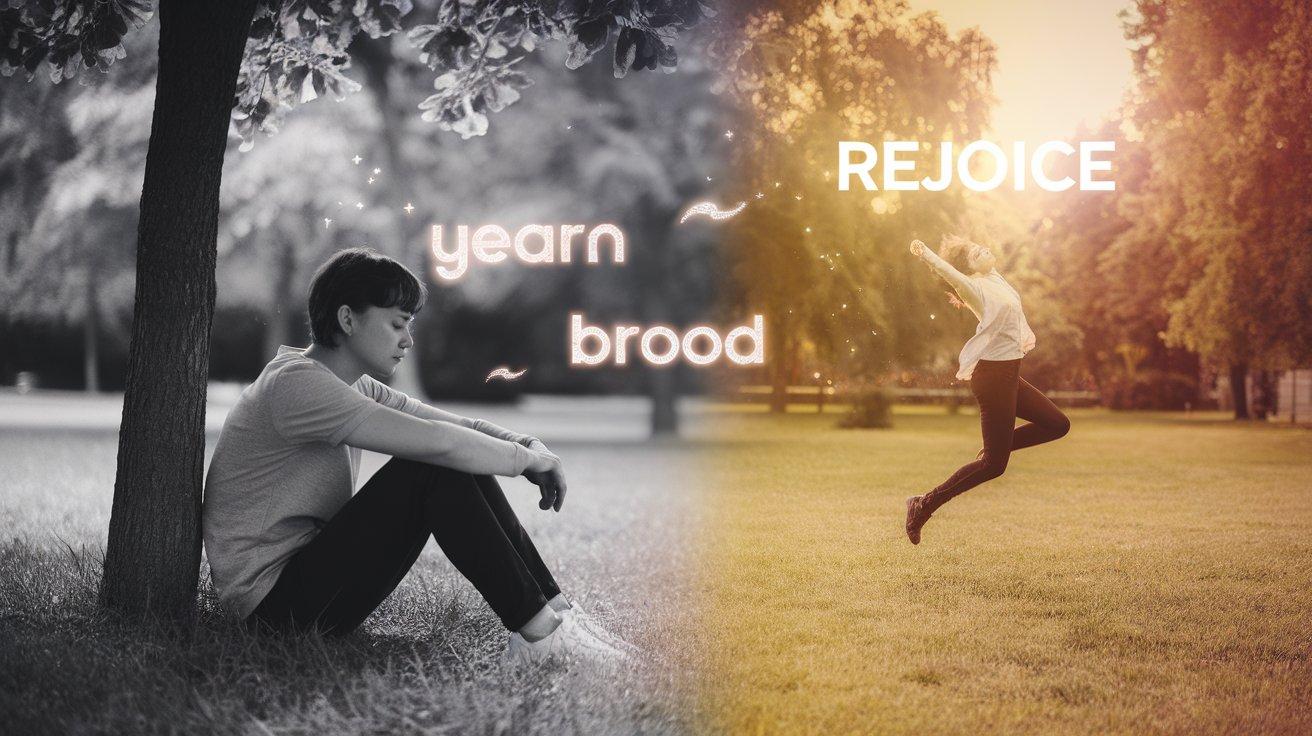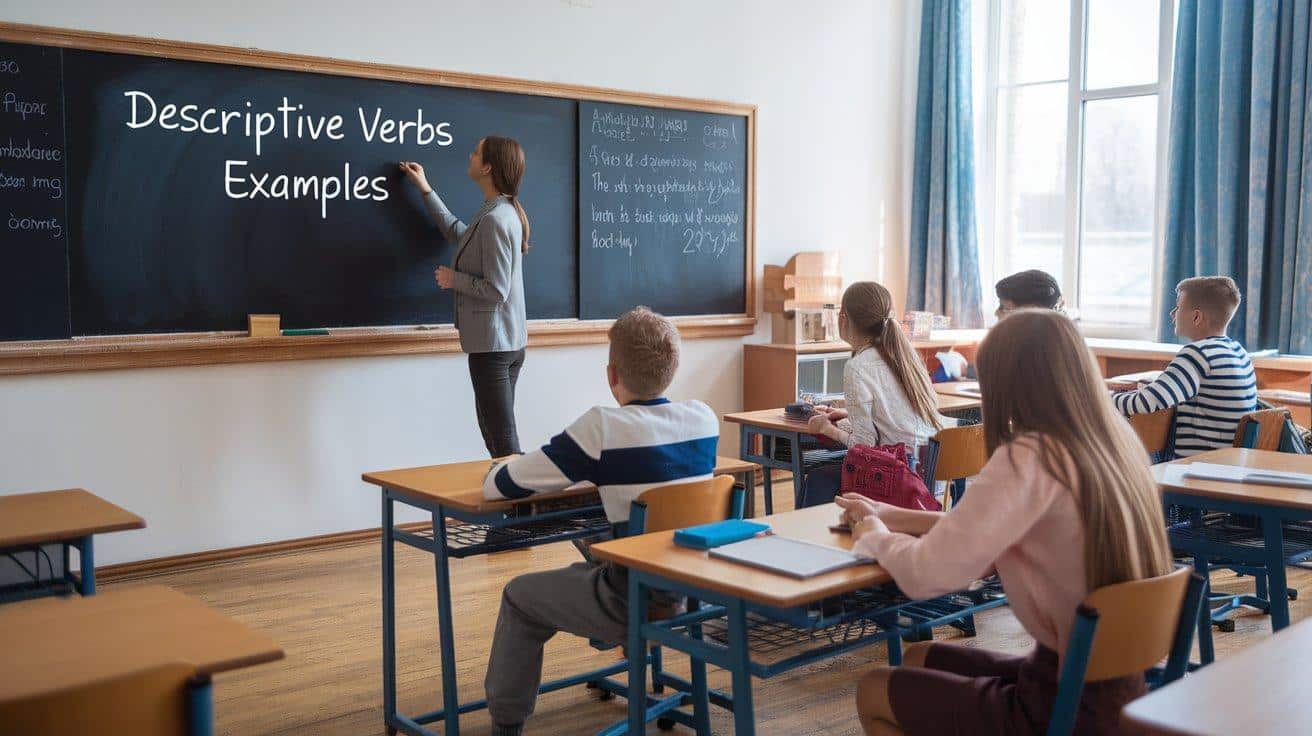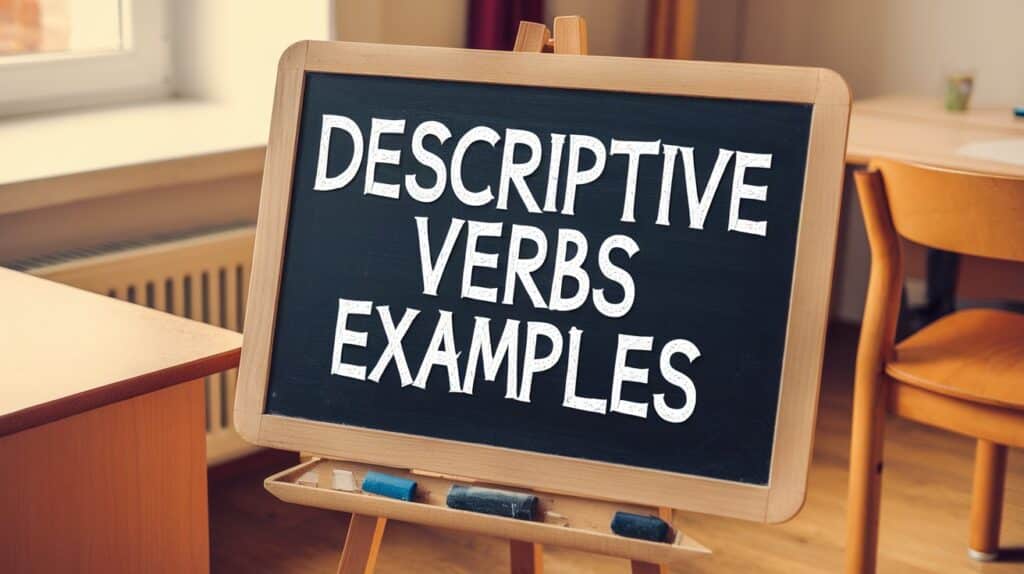Want to make your writing stand out? Weak verbs like “walk” and “say” often make sentences fall flat. However, picking the right verbs can turn simple stories into vivid experiences that capture your readers’ attention.
Here’s the good news: This guide brings you 50 carefully selected verbs that will strengthen your writing.
Each word has been tested and proven to add power and precision to sentences. You’ll find them grouped into helpful categories like movement, speech, and emotion.
By the end of this article, you’ll know exactly how to replace basic verbs with more precise ones that paint clear pictures in your readers’ minds. No more settling for dull, lifeless prose.
I’ve spent years teaching writing techniques to students and professionals. These 50 verbs consistently help writers express their ideas with greater impact.
Ready to make your words work harder? Let’s begin.
Why Descriptive Verbs Are Essential for Impactful Writing

Strong verbs do more than tell what happens – they show it. Let me explain why choosing specific verbs matters in your writing.
Conveying Action with Precision
Basic verbs like “went” or “moved” give readers only a vague idea of what’s happening. Think of verbs as the engine of your sentences.
When you write, “The cat went across the room,” readers see a basic movement. But write, “The cat strutted across the room,” and suddenly, they see attitude and style.
Here’s what specific verbs do for your writing:
- They cut down on extra words
- They create clear mental images
- They tell readers exactly how something happened
Engaging the Reader’s Imagination
Your brain responds to specific verbs. When you read “The chef chopped the onions,” your mind might picture a quick, routine action. But if you read “The chef minced the onions,” you see more detail – tiny, precise cuts and careful knife work.
The right verb puts readers in the scene. They don’t just read about what happened; they see and feel it too.
Enhancing Storytelling and Narration
Strong verbs build better stories. They help readers:
- See clear pictures in their minds
- Feel the emotions in each scene
- Understand characters better
- Follow the action easily
When I write “Sarah spoke,” you get basic information. But if I write “Sarah whispered” or “Sarah shouted,” you know both what happened and how it happened. One word tells a bigger story.
Remember: Good writing isn’t about using fancy words. It’s about picking the right words that show exactly what you mean.
Movement Verbs
- Glide – To move smoothly and effortlessly.
Example: The swan glided across the lake, leaving barely a ripple behind. - Sprint – To run at full speed over a short distance.
Example: He sprinted to catch the bus as it pulled away from the stop. - Tumble – To fall or roll end over end.
Example: The children tumbled down the grassy hill, laughing all the way. - Lunge – To move forward suddenly and forcefully.
Example: She lunged at the ball, just managing to save it from going out of bounds. - Saunter – To walk in a slow, relaxed manner.
Example: He sauntered into the room, exuding confidence. - Leap – To jump or spring a long distance.
Example: The deer leaped gracefully over the fence and disappeared into the woods. - Skid – To slide uncontrollably across a surface.
Example: The car skidded on the icy road, narrowly avoiding an accident. - Twirl – To spin around quickly.
Example: She twirled in her new dress, showing it off to everyone. - Pace – To walk back and forth in a regular rhythm.
Example: He paced nervously outside the hospital room, waiting for news. - Charge – To move forward with force and determination.
Example: The soldiers charged into battle with their banners held high.
Emotion Verbs

- Fume – To express anger or annoyance.
Example: He fumed silently as the waiter spilled coffee on his suit. - Rejoice – To feel or show great joy.
Example: The crowd rejoiced when their team scored the winning goal. - Tremble – To shake involuntarily with emotion.
Example: She trembled with excitement as she opened the acceptance letter. - Sulk – To be silent and bad-tempered due to disappointment.
Example: He sulked in the corner after losing the game to his younger sibling. - Yearn – To have an intense longing for something.
Example: She yearned for the days when life was simpler and carefree. - Brood – To think deeply about something that makes you unhappy.
Example: He brooded over his mistake, unable to shake the feeling of regret. - Shriek – To cry out in high-pitched excitement or fear.
Example: The children shrieked in delight as the roller coaster plummeted. - Gasp – To inhale sharply due to surprise or shock.
Example: She gasped when she saw the surprise party waiting for her. - Wince – To flinch or grimace in pain or distress.
Example: He winced as the nurse administered the injection. - Blush – To redden due to embarrassment or shyness.
Example: She blushed when her crush complimented her.
Sound Verbs
- Whisper – To speak softly without vocalizing.
Example: She whispered her secret to her best friend in the library. - Roar – To make a loud, deep sound.
Example: The lion roared, asserting its dominance over the territory. - Murmur – To speak quietly and indistinctly.
Example: The audience murmured in agreement as the speaker concluded. - Buzz – To produce a low, continuous humming sound.
Example: The bees buzzed around the vibrant flowers in the garden. - Clatter – To make a series of loud, rattling noises.
Example: The dishes clattered noisily as they fell off the counter. - Rustle – To make a soft, crackling sound.
Example: The leaves rustled in the gentle breeze. - Chime – To make a clear, ringing sound.
Example: The grandfather clock chimed the hour, echoing through the house. - Creak – To make a high-pitched, groaning noise.
Example: The old wooden floor creaked under his weight as he walked. - Howl – To make a long, loud, mournful sound.
Example: The wolves howled under the full moon, filling the night with their calls. - Snarl – To make an aggressive, guttural sound.
Example: The dog snarled at the stranger, its teeth bared.
Thought Verbs

- Ponder – To think deeply about something.
Example: She pondered the meaning of life while gazing at the stars. - Deduce – To infer or conclude from evidence.
Example: The detective deduced the culprit’s identity from the clues at the scene. - Muse – To reflect on something thoughtfully.
Example: He mused about the possibilities of a future filled with adventures. - Speculate – To form a theory without firm evidence.
Example: They speculated about the outcome of the election over coffee. - Contemplate – To consider something thoughtfully for a long time.
Example: She contemplated changing careers to follow her passion. - Ruminate – To think carefully and repeatedly about something.
Example: He ruminated on the consequences of his actions during the long drive home. - Analyze – To examine methodically and in detail.
Example: The scientist analyzed the data to draw a meaningful conclusion. - Imagine – To form a mental image of something.
Example: The child imagined a castle made of candy and chocolate rivers. - Conclude – To arrive at a decision or opinion.
Example: After much debate, the committee concluded the project should move forward. - Recall – To remember or bring something back to mind.
Example: She recalled the day she graduated with vivid detail.
Change Verbs
- Morph – To change shape or form smoothly.
Example: The caterpillar morphed into a stunning butterfly. - Evolve – To develop gradually over time.
Example: Technology has evolved significantly in the last decade. - Diminish – To decrease in size, importance, or intensity.
Example: His enthusiasm diminished as the project dragged on. - Transform – To change dramatically in form or appearance.
Example: The abandoned building was transformed into a vibrant community center. - Alter – To make a small change to something.
Example: She altered the hem of her dress to make it fit perfectly. - Expand – To increase in size, volume, or scope.
Example: The company expanded its operations to include international markets. - Shrink – To decrease in size or amount.
Example: The sweater shrank after being washed in hot water. - Switch – To replace one thing with another.
Example: He switched the old tires for new ones before the long journey. - Adapt – To adjust to new conditions or requirements.
Example: Animals often adapt to their environment to survive. - Renew – To restore to an original or improved state.
Example: She renewed her library card to borrow more books.
Practical Tips for Using Descriptive Verbs

Let me share some straightforward ways to use strong verbs without overdoing it. These tips will help you write clearly and effectively.
Avoiding Overuse of Verbs
Too many strong verbs can make your writing feel forced. Here’s how to keep the right balance:
- Use one standout verb per paragraph
- Mix simple and strong verbs naturally
- Pick verbs that fit your meaning exactly
Think of strong verbs like spices. Just as you wouldn’t add hot sauce to every meal, you don’t need powerful verbs in every sentence. Sometimes, “walked” works better than “sauntered.”
Balancing Descriptive Verbs with Simplicity
Good writing flows naturally. Consider these points:
- Start with clear, simple verbs
- Replace weak verbs only when needed
- Read your work out loud to test how it sounds
Remember this rule: If a simple verb works well, use it. Your goal is clear communication, not showing off your vocabulary.
Matching Verbs with Tone and Genre
Different types of writing need different verbs. A business email needs simpler verbs than a short story. Here’s what I suggest:
For formal writing:
- Keep verbs professional
- Avoid slang
- Stay consistent with your tone
For creative writing:
- Try more expressive verbs
- Match verbs to your characters
- Paint pictures with your words
Quick test: When you pick a verb, ask yourself, “Does this word fit what I’m trying to say?” If it feels forced or awkward, try something simpler.
Exercises to Practice Using Descriptive Verbs

Let’s put these ideas into practice. I’ve created some simple exercises to help you get better at using strong verbs. You can do these in just a few minutes each day.
Rewrite Sentences with Stronger Verbs
Start with these basic sentences. Try making them better by changing just the verb:
Before: The dog went to his bowl. After: The dog bounded to his bowl.
Here are more sentences to practice with:
- The woman looked at the painting
- He ate his sandwich
- The leaves moved in the wind
- The car went down the street
Replace Adverbs with Descriptive Verbs
Look for words ending in “-ly” and replace them with stronger verbs. Here’s how:
Before: She walked quickly to the store. After: She rushed to the store.
Try fixing these:
- He spoke quietly during class
- The cat moved slowly across the floor
- She smiled happily at the news
- The wind blew strongly through the trees
Create a Short Story Using 10 New Verbs
Here’s a fun way to practice: Write a short story about making breakfast. But here’s the catch – you can’t use these common verbs:
- Make
- Put
- Get
- Go
- Take
Start with this opening: “Morning sunlight filled the kitchen as I…”
Then, keep writing, focusing on using specific verbs to tell your story. You might use words like:
- Scrambled
- Poured
- Stirred
- Flipped
- Sipped
Quick tip: Write your story first with any verbs that come to mind. Then, go back and replace the basic verbs with more specific ones.
Conclusion
Using better verbs makes your writing clearer and more interesting. You’ve learned how to pick the right verbs, when to use them, and how to practice improving your word choices. These skills will serve you well in any type of writing.
The most important takeaway: Strong verbs help readers see, feel, and understand your message better. They make your writing work harder without adding extra words.
Start small. Try changing one or two verbs in your next piece of writing. Notice how different word choices change how your sentences feel. Practice with the exercises I shared, and watch your writing grow stronger.
I’d love to hear how these tips work for you. Share your before-and-after sentences in the comments below. What verb changes made the biggest difference in your writing? Let’s learn from each other.


















